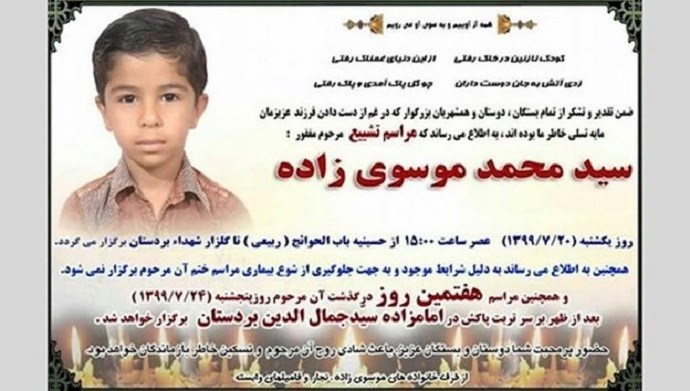Analysis by PMOI/MEK
Iran, October 14, 2020—Earlier this week, the devastating news of a schoolboy committing suicide shocked the Iranian society. Eleven-year-old Mohammad Mousavizadeh, who lived in Bushehr, southwest Iran, hung himself in his home because he couldn’t attend online classes. Due to the unbridled spread of coronavirus, many of Iran’s cities have shut down schools and implemented rules to hold classes online.
But for many families, including Mohammad’s, online classes are not an option due to their lack of access to mobile devices and internet connection.
The state-run news agency Rokna quoted Mohammad's mother as saying, "We had a problem for two or three months. My son did not have a proper phone. The mobile phone he had was faulty. We did not have a good life. We were living in a rental home with an ailing husband. I have a few other children. Mohammad needed a mobile phone because the one we had did not work properly. He could not send audio or take photos with it. He did not say anything. His teacher asked him to send an audio file or send an image. We told his teacher what was going on. His teacher told him to go and tell (your problem to) your father, not me. This is our story."
Mohammad’s mother, who cleans houses to make a meager living for her family, found Mohammad’s body in their home’s kitchen floor after he had hung himself.
Sadly, Mohammad’s is not an isolated case.
According to a September 14 report by the state-run daily Hamshahri, 14-year-old Mani from Kermanshah, died while he was trying to earn the money needed to buy the smartphone he needed for his class. Mani had joined porters, groups of residents on Iran’s border villages and cities who carry heavy loads on their backs across borders to earn their living. Mani fell down a mountain and died while he was being pursued by regime security guards.
These tragic incidents are happening while the regime has claimed that it will address requirements for online education for free, including providing smartphones and free internet for students. But government officials are predicting a probability of 36 percent of boys dropping out of school due to poverty and inability to provide mobile phones or tablets, particularly in the rural areas. On September 1, the state-run daily Javan quoted the Director-General of Education for Kerman Province as saying, "More than 240,000 students in Kerman Province do not have smartphones."
Unfortunately, the suicide of children in Iran is becoming all too common.
Earlier this year, 12-year-old Armin, also from Kermanshah, killed himself by taking a handful of pills. Armin’s mother had died of cancer a few weeks earlier, and the family couldn’t even pay the hospital’s bill. Armin was collecting garbage to make ends meet.
In April, Zeinab, an 11-year-old girl from a village in Ilam province, hung herself out of shame of wearing worn-out clothing. Her family could not afford to buy her new clothes even on the eve of the Persian New Year.
The catastrophic situation of students and children of workers and laborers, especially in deprived areas of the country, results from the criminal and plundering policies of the religious fascism ruling Iran.
While the vast majority of Iranians are unable to acquire the necessary masks and minimum requirements to protect themselves against coronavirus, the clerical regime is plundering the national wealth or squandering it on its missile and nuclear programs or its warmongering abroad.
And the most innocent segment of the Iranian society is becoming the victim of the most destructive policies of the mullahs.





